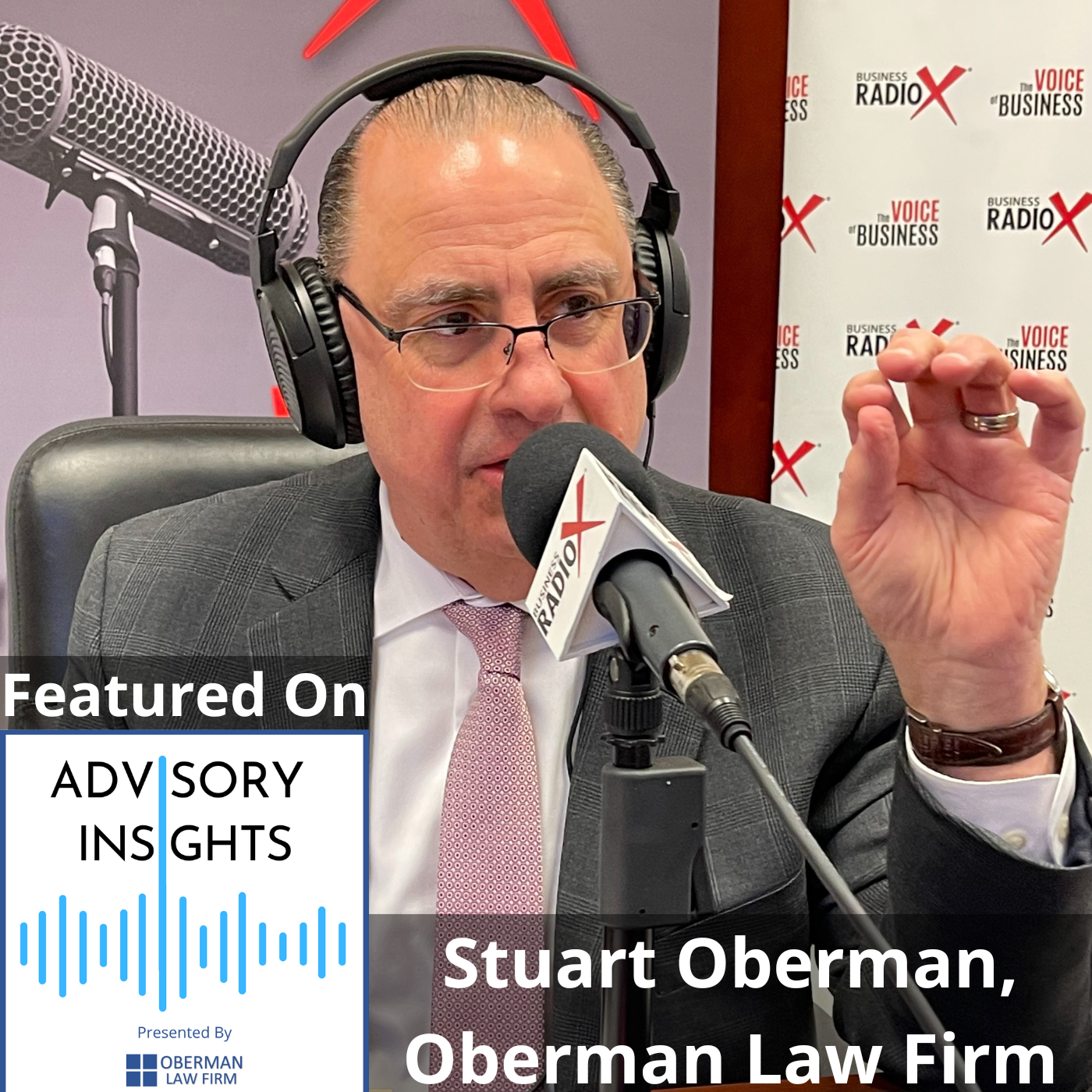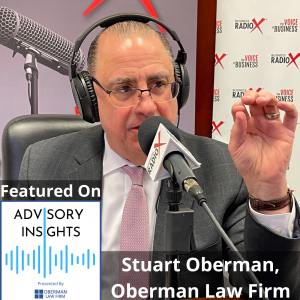
What You Must Know When Forming an LLC, Partnership, or Corporation (Advisory Insights Podcast, Episode 36)
On this episode of Advisory Insights, Stuart Oberman of Oberman Law Firm discussed some of the key considerations for businesses when forming an LLC, partnership, or corporation. He stressed the importance of having a well-designed agreement in place that covers key topics such as arbitration provisions, buy/sells, and valuation methods.
Advisory Insights is presented by Oberman Law Firm and produced by the North Fulton studio of Business RadioX®. The series can be found on all the major podcast apps. You can find the complete show archive here.
TRANSCRIPT
Intro: [00:00:01] Broadcasting from the Studios of Business RadioX, it’s time for Advisory Insights. Brought to you by Oberman Law Firm, serving clients nationwide with tailored service and exceptional results. Now, here’s your host.
Stuart Oberman: [00:00:20] Hello, everyone. Stuart Oberman. Welcome, welcome to Advisory Insights. All right. We’re going to have some great stuff. As we start going quickly, quickly, quickly into 2023, I want to make sure that everyone is structurally prepared internally for their corporations, partnerships, LLCs.
Stuart Oberman: [00:00:39] We do a substantial amount of entity formations, buy-ins, buyouts, partnerships, formations for global companies, local companies, regional companies. Last year, we did about 145 transitions, mergers, acquisitions, probably total about $450 million worth of revenue on those, total practice values, and everything, business values.
Stuart Oberman: [00:01:05] So, I want to run quickly through some items that we noticed time and time and time again on some problems. So, first and foremost, whenever you’re forming a corporation, you got to look at a couple areas. So, you have to know, and your advisors have to know, your CPAs have to know, your attorneys have to know what are the best practices. Each state is completely different as to what the requirements are. You have to know what your documents are. You have to know what the record keeping is. You have to understand what your corporate responsibility is document-wise. You have to understand what the LLC documents are. You have to understand whether or not you have to have a publication involved.
Stuart Oberman: [00:01:49] And, also, what are the valuations. When you form an entity, when you form a corporation, you form an LLC, what is what we call a capital contributions? What are you bringing to the table? Is it $1? Is it your services rendered? It has to be an accounting process for this because it has to go into the operating agreement. It has to go into the corporate documents. And I’m going to get into a list of corporate documents a little bit later in this particular podcast.
Stuart Oberman: [00:02:18] So, one area we have to look at is, of course, an entity selection. What is best for you? There are no right or wrong entities necessarily. It’s just what is your structure? So, of course, you’ve got your corporations, right? Now, people get confused. I want to be a Sub-S. I want to be a C-Corp. So, those are tax elections. They’re not “corporate structures.”
Stuart Oberman: [00:02:50] So, there’s only really one kind of corporation. Depending on your state, you could have a professional corporation, you can have a PLLC, professional liability corporation. So, you’ve got a lot of things but, basically, you’re looking at the corporation. Then, you have limited liability company. Again, depending on your state, you can have a PLLC, you can have variations of these.
Stuart Oberman: [00:03:16] So then, you look at what are your partnerships. That’s a whole different world. Partnerships. They’re like a marriage. They’re easy to get in. They are a disaster to get out. If you’re even contemplating a partnership, who’s going to own their respective shares? You got two owners, individually or is each owner going to have their own entity, LLC, if you will, and then you have a master – what we call – mothership LLC. Again, those are very, very specific things you’ve got to really take a look at.
Stuart Oberman: [00:03:53] Then, you’ve got joint ventures. So then, you’ve got partnerships on joint ventures. Then, you have joint ventures LLCs. You got operating agreements. You’ve got, again, buy-ins, buy outs. So, those are all extremely technical areas you really, really have to know.
Stuart Oberman: [00:04:12] So then, you’ve got to look at what entity is going to protect the owners or owner of the companies. What are the rights and obligations of the owners? Again, internal documents. Easy to get in, hard to get out. You’ve got to know how you go into a marriage and how you’re getting out, what are the breakups, what are the wind downs, how are you going to break up the the assets, if you will. So, again, determine the entity status.
Stuart Oberman: [00:04:39] So then, this is where your advisors come in. You’ve got to look at really the benefits and pitfalls of establishing each entity. You can’t just jump and say, I want to be this or I want to be that. You have to figure out the end game, taxes, liability, crossing jurisdictional matters. What may work in Texas is not going to work in Maine. What’s going to work in Maine is not going to work in Washington. So, again, look at those things.
Stuart Oberman: [00:05:08] Tax issues. So, you’ve got a couple areas to look at. One is the S-Corp. That is best place for small businesses. Your CPA will be very familiar with that. There are certain time limits that that has to be election-wise with the IRS once you are set up. Your C-Corps, you’ve got to be really careful on that, because if you go to sell your business and you’re a C-Corp you have some problems with some tax, some goodwill matters.
Stuart Oberman: [00:05:40] And the partnerships, is it going to be a mothership scenario where you’ve got owners filing their own LLCs? Is it going to be taxed, again as a partnership, how is each entity going to be taxed? Is this particular partner going to be a S-Corp? Again, very, very complex. So, you look at the formation. You look at your operation. And you look at the termination.
Stuart Oberman: [00:06:06] Pitfalls. Who’s going to get the tax ID number, state and federal? So, when your federal, someone in the organization has to file for a tax ID number. Whose Social Security number is that going to be filed with? Because if it’s under your tax, if it’s under your Social Security number, you are essentially going to be responsible for a lot of tax matters. What’s the tax efficiency? What’s the best tax structure? Is it a tax exempt? Certain areas are tax exempt, state, federal.
Stuart Oberman: [00:06:43] Again, you’ve got to look at your CPA for these things. You’ve got to look at your financial advisors. And they have to be familiar with business. Some CPAs are not familiar with business structures. It’s just the way it is. So, again, pick your advisors carefully.
Stuart Oberman: [00:06:56] A couple of documents – as we’re sort of near closing – we should really take a look at. So, corporation’s bylaws, minutes, LLCs and corporations, consents LLC and corporations, operating agreement primarily generally in your LLC formations, that will get you started on everything from how you run the business, tax consequences, how you wind it down, what the partnerships distributions are. That is your structure.
Stuart Oberman: [00:07:32] With any joint venture, you have to have or should have a joint venture agreement. Any business that has more than one owner or partnership should have, in my recommendation, a very strong buy-in. Is it going to have arbitration provisions? Is it going to be a buy/sells? Are you going to have sort of a baseball arbitration where if one person can’t agree on the valuation, then the other person hires another appraiser, then all of a sudden you’ve got the two appraisers that are going in and equally dividing the difference between the two appraisals and come up with a number? Again, you can’t assume all this. This has to be the structure that you have to look at.
Stuart Oberman: [00:08:18] Well, folks, I know that’s a quick podcast today, but these are so many things that you just have to look at. I could literally probably talk on each topic for probably 30, 40 minutes. But this is an overall, really, really basic scenario generality that we run into. Again, it’s not the complex issues. Sometimes it’s the simplest things that get our practice owners, our business owners, our small business guys in trouble.
Stuart Oberman: [00:08:49] So, anyway, folks, thanks for joining us on the podcast today, Forming Corporations, Partnerships, LLCs, What you must know. If you have any questions, please feel free to give us a call, 770-886-2400, Oberman Law firm. Or email me at stuart, S-T-U-A-R-T, @obermanlaw.com Thanks folks, and have a fantastic day.
Outro: [00:09:14] Thank you for joining us on Advisory Insights. This show is brought to you by Oberman Law Firm, a business-centric law firm representing local, regional, and national clients in a wide range of practice areas, including healthcare, mergers and acquisitions, corporate transactions, and regulatory compliance.
About Advisory Insights Podcast
Presented by Oberman Law Firm, Advisory Insights Podcast covers legal, business, HR, and other topics of vital concern to healthcare practices and other business owners. This show series can be found here as well as on all the major podcast apps.
Stuart Oberman, Oberman Law Firm

Stuart Oberman is the founder and President of Oberman Law Firm. Mr. Oberman graduated from Urbana University and received his law degree from John Marshall Law School. Mr. Oberman has been practicing law for over 25 years, and before going into private practice, Mr. Oberman was in-house counsel for a Fortune 500 Company. Mr. Oberman is widely regarded as the go-to attorney in the area of Dental Law, which includes DSO formation, corporate business structures, mergers and acquisitions, regulatory compliance, advertising regulations, HIPAA, Compliance, and employment law regulations that affect dental practices.
In addition, Mr. Oberman’s expertise in the healthcare industry includes advising clients in the complex regulatory landscape as it relates to telehealth and telemedicine, including compliance with corporate structures, third-party reimbursement, contract negotiations, technology, healthcare fraud, and abuse law (Anti-Kickback Statute and the State Law), professional liability risk management, federal and state regulations.
As the long-term care industry evolves, Mr. Oberman has the knowledge and experience to guide clients in the long-term care sector with respect to corporate and regulatory matters, assisted living facilities, and continuing care retirement communities (CCRCs). In addition, Mr. Oberman’s practice also focuses on healthcare facility acquisitions and other changes of ownership, as well as related licensure and Medicare/Medicaid certification matters, CCRC registrations, long-term care/skilled nursing facility management, operating agreements, assisted living licensure matters, and health care joint ventures.
In addition to his expertise in the healthcare industry, Mr. Oberman has a nationwide practice that focuses on all facets of contractual disputes, including corporate governance, fiduciary duty, trade secrets, unfair competition, covenants not to compete, trademark and copyright infringement, fraud, and deceptive trade practices, and other business-related matters. Mr. Oberman also represents clients throughout the United States in a wide range of practice areas, including mergers & acquisitions, partnership agreements, commercial real estate, entity formation, employment law, commercial leasing, intellectual property, and HIPAA/OSHA compliance.
Mr. Oberman is a national lecturer and has published articles in the U.S. and Canada.
Oberman Law Firm
Oberman Law Firm has a long history of civic service, noted national, regional, and local clients, and stands among the Southeast’s eminent and fast-growing full-service law firms. Oberman Law Firm’s areas of practice include Business Planning, Commercial & Technology Transactions, Corporate, Employment & Labor, Estate Planning, Health Care, Intellectual Property, Litigation, Privacy & Data Security, and Real Estate.
By meeting their client’s goals and becoming a trusted partner and advocate for our clients, their attorneys are recognized as legal go-getters who provide value-added service. Their attorneys understand that in a rapidly changing legal market, clients have new expectations, constantly evolving choices, and operate in an environment of heightened reputational and commercial risk.
Oberman Law Firm’s strength is its ability to solve complex legal problems by collaborating across borders and practice areas.
Connect with Oberman Law Firm:
Company website | LinkedIn | Twitter
















